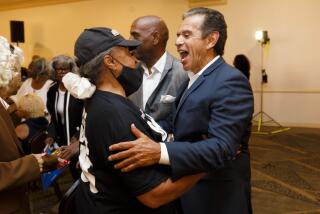It’s About Being Comfortable With a Candidate
- Share via
Peel away all the ponderous policy positions and the feel-good fuzz and the L.A. mayoral race comes down to this: excitement vs. experience.
Pizazz vs. pothole fixer. Bully pulpit vs. maintenance yard.
But also: some risk vs. safe. The unknown vs. the predictable. New product vs. brand name.
And inevitably, the rarely-asked-in-public question: Is L.A. ready for a Latino mayor?
City Atty. James K. Hahn will tell you that’s not the question at all. The question is whether this city is ready for that Latino, Antonio Villaraigosa. In the end, he’s right. But for that question to be answered affirmatively, the first also must be.
Tom Bradley was the perfect candidate to become L.A.’s first black mayor 28 years ago--imposing, mild-mannered, statesmanlike. Nonthreatening. A well-known city councilman. His time had come; history was on his side. And his opponent, demagogic Mayor Sam Yorty, had long since worn out his welcome.
Villaraigosa is charming, but maybe a shade too flashy for some. Regardless of a productive legislative career in a short period, he has never held elected city office. History also is on his side. But to become L.A.’s first Latino mayor since 1872--and the most prominent Latino politician in America--the former barrio street kid must convince Angelenos he’s up to leading their city. He must seem minimum-risk.
Hahn just looks like a mayor: imposing, mild-mannered, statesmanlike. Well-known city attorney, whose revered late father was the consummate L.A. politician. He’s Bradley-like, without the excitement of history in the making.
Unlike Yorty, Hahn is no race-baiting demagogue. Neither he nor his chief strategists--Bill Carrick and Kam Kuwata--would ever run a campaign catering to bigots.
Regardless, bigotry is out there. How much still, we may never know. Voters do not admit to bigotry in exit polls.
“Are there going to be people who vote against [Villaraigosa] because of his race? Unfortunately, I would be lying if I said no,” says Kuwata, who is of Japanese ancestry. “Will there be people voting for him only because of his race? Unfortunately, yes.”
Villaraigosa’s campaign strategist, Parke Skelton, agrees: “All things taken together, it’s kind of a wash. On the one hand, we get a bump because of enthusiasm in the Latino community. But that’s probably offset by some people who feel it’s not quite time to elect a Latino mayor.”
The Latino bump is key. The election will turn on turnout. Latinos are 41% of the city’s voting-age population. But on primary election day, they represented only 20% of the voters, according to The Times’ exit poll. Whites are 34% of the adult population, but were 52% of the voters. Blacks: 11% and 14%, respectively.
Latinos voted overwhelmingly for Villaraigosa--62% to just 7% for Hahn. But whites also gave Villaraigosa a slight edge, 23% to 19%. Hahn dominated among blacks, 71% to 12%.
The battle now is for the 45% of voters who supported some other candidate. Probably 5% to 10% are still up for grabs in this tight race, strategists estimate.
People tend to be leery--some even frightened--of the unknown. Villaraigosa is unknown on two counts: Many aren’t sure what a Latino mayor would be like. And this Latino is short on City Hall experience.
Combine the inexperience with a liberal legislative voting record--especially against a Hahn anti-gang measure--and it’s fair game for Hahn to run TV ads asserting: “You can’t trust Antonio Villaraigosa.”
Some bigots, of course, will hear that as: You can’t trust a Latino.
Villaraigosa’s TV ad creator, David Doak, has advised successful minority candidates before. One was David Dinkins, an African American elected New York mayor.
“Minority candidates must have a warmth factor that allows the majority to get over their fear of voting for them,” Doak says. “Antonio has a captivating warmth about him. . . .
“This is the great power of television because it can exhibit personality. People get a sense of knowing the candidate.”
Confrontation frightens, so a positive, upbeat campaign also is essential. That happens to fit Villaraigosa’s outgoing personality. His message is about bringing people together and hope. “I want to make the California dream an urban home here in the city of Los Angeles,” he said in Tuesday’s debate at The Times.
One Hahn debate message: “Mr. Villaraigosa’s voting record is out of step with most people in Los Angeles.”
But Hahn also is a liberal. This election really is about voter comfort levels.
Fortunately, L.A. voters should feel comfortable with either candidate.
More to Read
Sign up for Essential California
The most important California stories and recommendations in your inbox every morning.
You may occasionally receive promotional content from the Los Angeles Times.














